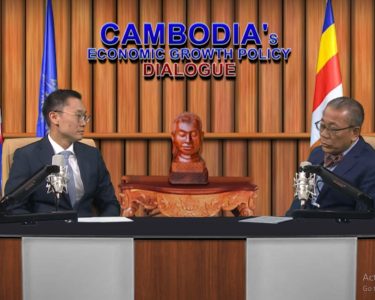Cambodia Investment Review
Thierry Tea, Vice President of OCIC Group and founder of Negocia Capital, recently outlined his strategic vision for Cambodia’s economic future, emphasizing the importance of long-term planning, infrastructure investment, and nurturing local talent.
Speaking during the 149th episode of the Rising Giants podcast, Tea offered insights into the Kingdom’s evolving investment climate and the pivotal role the private sector must play in the country’s next phase of development.
With a corporate and entrepreneurial background spanning real estate, aviation, venture capital, and technology, Tea is widely recognized as a driving force in Cambodia’s urban transformation.
He currently sits on the boards of CamTech University and Dichi Academy, reflecting his commitment to education and entrepreneurship as central pillars of national progress.
Cambodia Urged to Focus on Long-Term Strategy
Addressing recent developments in U.S. trade policy and shifting geopolitical dynamics, Tea said Cambodia must maintain its focus on long-term structural growth rather than only reacting to short-term external shocks.
“Tariffs and political cycles will come and go,” he said. “The priority must remain on investing in education, digital infrastructure, and foundational reforms in sectors and policies that can strengthen Cambodia’s competitiveness over the next 50 years.”
Tea highlighted Cambodia’s youthful demographic profile and high reproduction rate as significant advantages, with a median age of 27 and 2.51 fertility rate, compared to aging or declining populations elsewhere in the Asia Pacific region. He noted that with continued population growth and the right policy mix, the country could position itself as a key niche market for regional and global investors.

OCIC’s Role in Shaping Urban Development
Over the past two years, Tea has helped lead OCIC’s transformation from a traditional real estate developer to an innovation-focused ecosystem builder. A key example is the rapid growth of the Koh Pich district in Phnom Penh, which now hosts more than 150 new businesses including Cambodian startups as well as dynamic local and international brands.
“We’ve moved from a ‘build and sell’ model to one that is service-oriented and community-driven,” he explained. “We see ourselves as opportunities enablers—bringing in partners, fostering innovation, and helping our tenants or customers succeed in the long term.”
The district has attracted notable technology and lifestyle brands, including Labaab, KOI Thé, U Care Pharmacy, 7-Eleven, eMart24, Breadtalk, Starbucks Reserve, Kobe Teppanyaki, Kyo Shabu or Coffee Corner, as well as education and innovation centers like Dichi Academy, Smart Axiata’s startup incubator, Korean coding school Above and Beyond, RobotYoung robotics Academy, AI Farm, Dreamlabs or Sabay Digital.
Tea said OCIC’s broader goal is to create a commercially viable and socially impactful urban environment. “We want to contribute to a new business culture—one based on collaboration, creativity, and mutually beneficial long-term value.”
Infrastructure Projects Designed to Shape the Next Century
OCIC is also leading the construction of the Techo International Airport, which is expected to begin operations in September-October. Designed by Foster + Partners, the new airport will be one of the largest in the region, with capacity to handle up to 15 million passengers annually in its first phase and up to 50 million in subsequent decades to comes.
“This is a legacy project—not just for OCIC, but for Cambodia,” Tea said. “It’s being built by Cambodians with support from international partners, and it sets the tone for how we want the world to see Cambodia.”
The airport is already driving new investment in surrounding areas, including roads, green spaces, and commercial hubs aimed at boosting trade, tourism, and long-term economic growth.

The Case for a Cambodian Financial Hub
Tea also backed the idea that Cambodia could eventually develop a specialized international financial center, similar to Singapore’s model, by simplifying regulations and adopting investor-friendly legal and tax frameworks.
Read More: Cambodia Leadership Review Top 50 2025: Thierry Tea – OCIC Group Vice President
“We’re not there yet, but we’re progressing,” he said. “Digital adoption has accelerated post-COVID.
The tax and commerce ministries are working to make reforms, and this is very much needed for the startup ecosystem that is growing and maturing. If we keep building capacity, we can aim to compete regionally.”
He argued that better coordination between ministries and the private sector is essential to accelerate reforms that improve investor confidence, particularly in areas such as digital company registration and company closure, corporate banking, and capital markets.
Investing in the Next Generation
In addition to his leadership roles at OCIC, and his international business ventures, Tea is increasingly focused on supporting Cambodia’s startup community. As Vice Chairman of the Federation of Cambodian Startups and a newly appointed Board Director at CamTech University, he is helping to build bridges between large conglomerates and early-stage entrepreneurs as well as developing cross borders partnerships that can help provide higher quality and opportunities for Cambodian students.
“Startups today don’t just need funding—they need mentorship, legal and accounting support, or access to networks,” he said. “That’s where private sector players like us can really contribute.”
OCIC and Canadia Group are launching a new impact venture capital fund to support local startups, with plans to co-invest alongside international partners from the Philippines, France, US, China and Singapore.
Tea pointed to Grab’s recent acquisition of Cambodian food delivery platform Nham24 as a milestone moment. “This was the largest startup exit in Cambodian history, likely in the $30 or $50 million range,” he said. “Deals like this show what’s possible.”

Looking Ahead
As Cambodia targets middle-income status by 2050, Tea believes the momentum is building for the country to enter a new stage of inclusive and innovation-led growth.
“The energy is here—the talent is here,” he said. “We’re at an inflection point. If we stay focused on better quality, better education, and strategic partnerships, Cambodia has the potential to become one of Southeast Asia’s standout niche investment destinations.”
Tea also noted that 2025 marks the 25th anniversary of OCIC Group, with several new projects and initiatives planned for release over the coming year.





